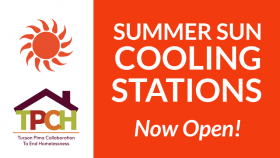| TPCH Newsletter – July 2022 |
| TPCH to Host Webinar on Newly Released HUD Funding Opportunity for Unsheltered Homelessness SAVE THE DATE: Friday, July 22, 2022 from 9am-10:30am, TPCH will be hosting an informational webinar to discuss this new funding opportunity. Click here or on the image below to register. 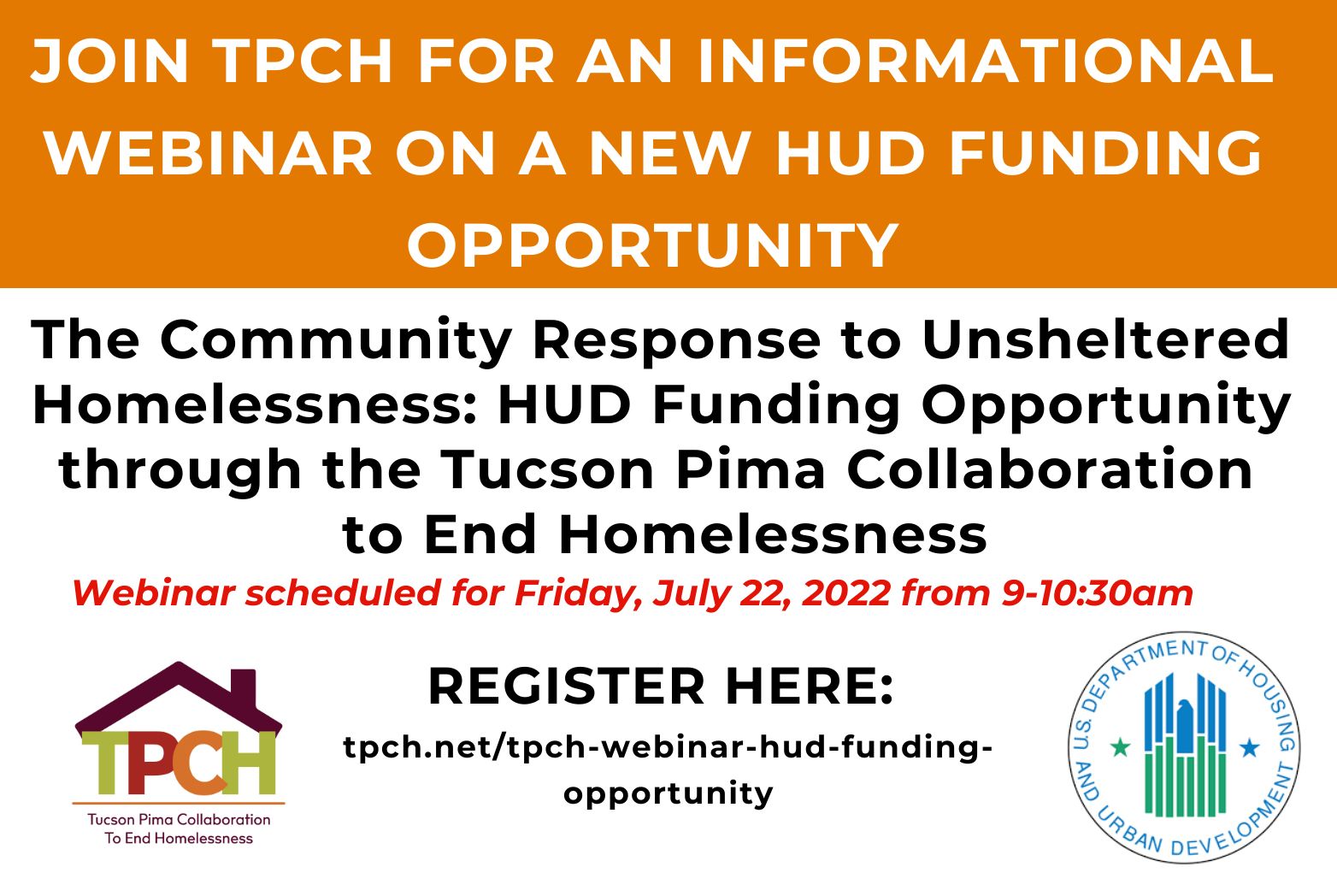 Learn more about the Tucson Pima Collaboration to End Homelessness, its role in preventing and ending homelessness in Pima County, and and an exciting new HUD funding opportunity available via the newly released HUD Supplemental NOFO (Notice of Funding Opportunity) for Unsheltered and Rural Homelessness. This webinar is intended for current and future HUD (Department of Housing and Urban Development) Continuum of Care grant recipients and subrecipients. Click here to register! Featured Blog Post form the National Alliance to End Homelessness: Unsheltered Homelessness and the One-time NOFO On June 22, 2022, the U.S. Department of Housing and Urban Development (HUD) released the Continuum of Care Supplemental to Address Unsheltered and Rural Homelessness (Special NOFO). This is a first-of-its-kind package of resources to address unsheltered homelessness and homeless encampments including funds set aside specifically to address homelessness in rural communities. During this session, training participants will: Learn about the role of the Tucson Pima Collaboration to End Homelessness as the Pima County Continuum of Care as it relates to HUD funding, Learn about a newly available HUD funding and how it relates to the strategies TPCH employs to prevent and end unsheltered homelessness, and Receive instructions regarding next steps for agencies interested in applying to the Tucson Pima Collaboration to End Homelessness for HUD funding through the NOFO to address unsheltered homelessness. Who Should Attend: This webinar is intended for current and future recipients and subrecipients of Continuum of Care funding in Pima County, Arizona. REGISTER HERE Featured Blog Post form the National Alliance to End Homelessness: Unsheltered Homelessness and the One-time NOFO HUD is making $322 million available for communities to address unsheltered and rural homelessness (approximately $267.5 million for unsheltered and $54.5 million for rural). The National Alliance for Ending Homelessness suggests the following approach: Be urgent, but equitable: leverage lessons learned from the work to equitably allocate recent COVID relief resources, such as Emergency Housing Vouchers. Communities that have done the hard work of incorporating people with lived experience, forming diverse committees, developing plans to advance equity, and similar measures, will be best prepared for the funding moment. The Alliance encourages readers to consult existing resources and evidence, including those provided by the Framework for an Equitable COVID-19 Homelessness Response, to guide these decisions. Help people facing the greatest needs: money set aside for unsheltered homelessness is specifically dedicated to serving the highest-need individuals and families, including those living in encampments. Avoid using these funds to serve those who could be aided with other resources. Ensure that people being served through these plans have meaningful choices and that plans adhere to Housing First principles and practices. Incorporate the needed services by collaborating closely with partners, including health care and housing providers, those focused on the needs of older adults, Tribal entities, and the U.S. Department of Veterans Affairs, among others. Scoring criteria in the NOFO emphasizes leveraging other resources besides this funding, both for housing and for health care. READ THE ENTIRE BLOG POST HERE VA Program To Provide Legal Services to Homeless Vets Agency Seeks Comments on Program Requirements Detailed in Interim Final Rule The Department of Veterans Affairs (VA) has authorized a new grant program that will award federal funds to eligible entities that will provide certain legal services for homeless veterans and veterans at risk for homelessness. The agency recently issued an interim final rule, which goes into effect July 1, establishing the program’s eligibility criteria, application requirements, scoring criteria, a list of constraints on the allocation and use of the funds, and other applicable requirements. To be eligible for funding under the program, a public or private entity must: (1) have the capacity to effectively administer the grant; (2) demonstrate that adequate financial support will be available to carry out the services for which the grant is sought, consistent with the legal services grant application; and (3) agree to meet the program’s applicable criteria and requirements. Eligible entities are state, local and tribal governments; local public authorities; school districts; special districts; intrastate districts; councils of government; any other regional or interstate governmental entity; nonprofit organizations; and organizations of past or present members of the U.S. Armed Forces. The VA plans to publish a Notice of Funding Opportunity with instructions on how to apply for this program in September, once the final rule is complete. Stakeholders interested in the program may comment on the interim final rule via Regulations.gov through Aug. 1 by referring to Docket No. VA-2022-VHA-0016. For More Information, read the announcement here and visit the interim rule, available at https://tinyurl.com/4xeaf3zz. Southern Arizona VA Health Care System (SAVAHCS) announces its annual Virtual Homeless Summit Save the Date: Thursday, July 28, 2022 This year’s SAVAHCS Virtual Homeless Summit will celebrate the theme of “Perseverance Through Difficult Times.” The summit will include remarks from the SAVAHCS VA Director, a discussion of the City of Tucson and the community’s response to homelessness, as well as a focus on how special populations can best access employment, peer support, and other critical services. Access this meeting with the following information: ZoomGov Meeting Dial in: Meeting ID: 161 748 2786 Access the meeting using this URL, or click on the image below: https://www.zoomgov.com/j/1617482786?pwd=MWRILzFHa1BmSkh4cnIMb3BUdIRDUT09 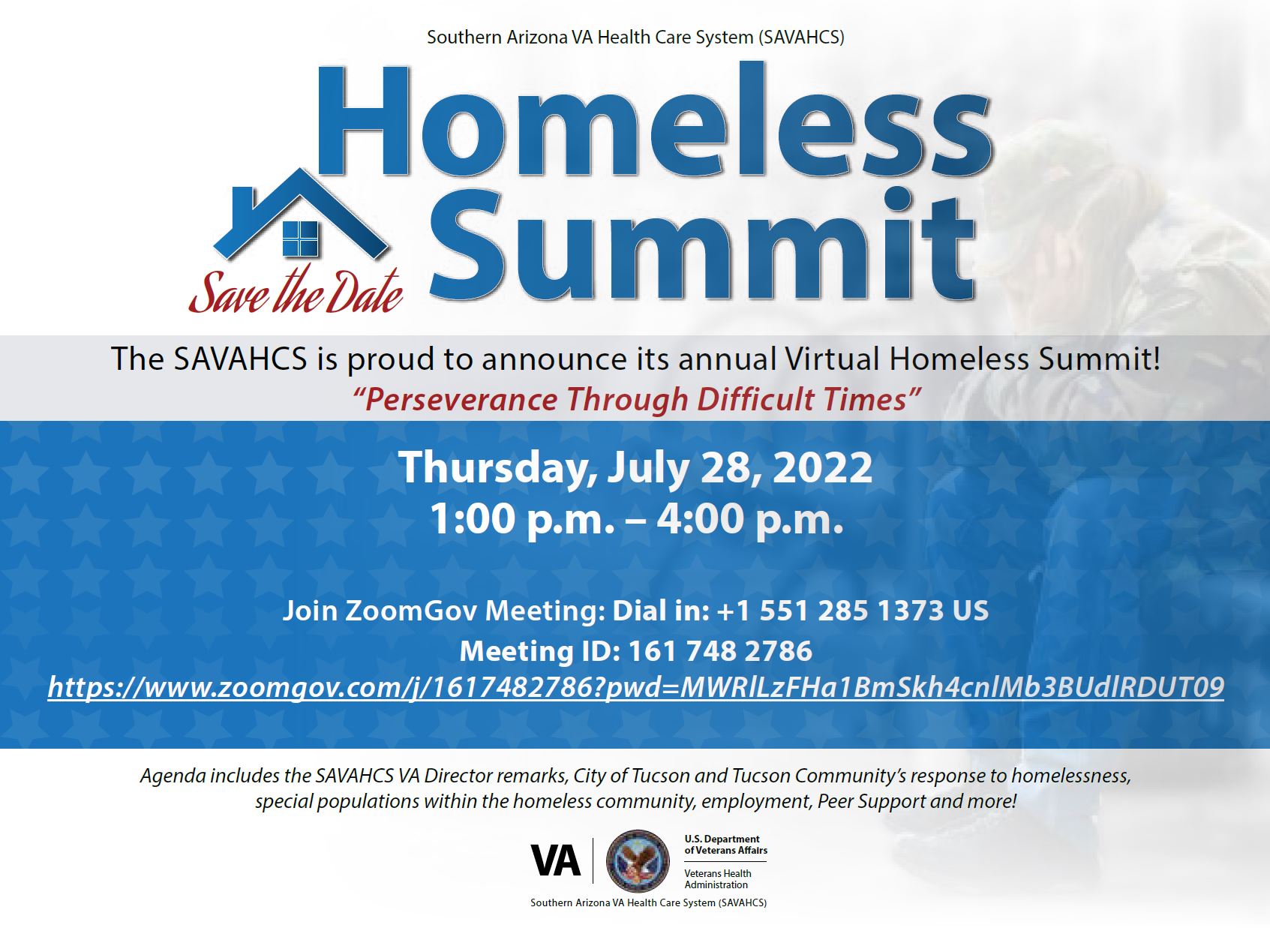 Arizona Housing Trust Fund Receives $60 million Expansion With the passage of the bipartisan state budget of almost $18 million, Arizona’s Housing Trust Fund is getting $60 million to fund affordable housing developments and housing aid across the state. While one-third of the housing funding is earmarked to help rural areas specifically, another $4 million will go to affordable housing programs for the Navajo and Hopi tribal nations. Click here or on the image below to read more. 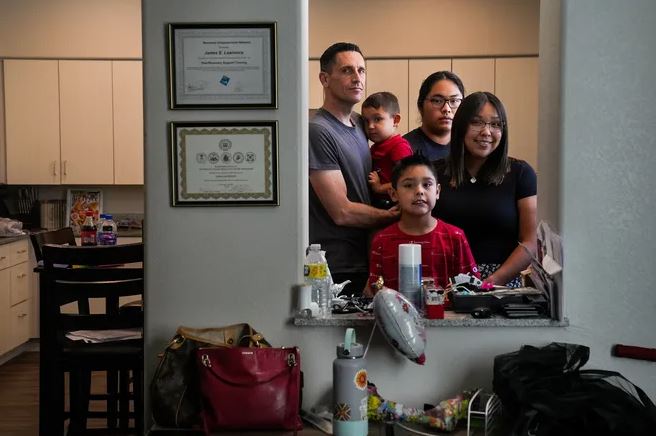 Advocates in Arizona have long called for committed and enduring expansions to the Arizona Housing Trust fund to address the severe shortage of affordable housing in Arizona. Read this brief from the Arizona State University Morrison Institute of Public Policy for calls to strengthen, not weaken, the Housing Trust Fund during the pandemic. City of Tucson Housing First Resource Line They just need to call a phone number and ask for the resource they’re looking for and, you know, ask for the resource. If they don’t have it immediately available to them, then they’ll escalate that call to somebody that can contact the person and give them the correct information.” -Brandi Champion, Housing First Director at the City of Tucson, in an interview with KGUN9. The City of Tucson has a new resource to help people experiencing homelessness as well as housed people concerned about homeless issues. Available 24/7, the phone line is available for connections to find emergency shelter, access domestic violence resources, to be assessed for housing services, and more. Call anytime, day or night, for these resources. Featured Report: “Shoestring Away from Nothing”: Experiences of Housing Insecurity in Pima County With support from the Arizona Community Foundation, the Morrison Institute for Public Policy has published a series examining housing security in Arizona. Using mixed methods, researchers found that focus group participants in Pima County identified a severe shortage of available apartments in any price range as a primary source of concern for their housing stability. Read more in the report and from the entire series here. U of A Southwest Institute for Research on Women releases census updates to Housing Insecurity and Potential Homelessness Report The University of Arizona Southwest Institute for Research on Women has released its thirty-fourth update to its report on Housing Insecurity Indicators and Potential Homelessness Estimates for Arizona and Pima County. This report measures current housing insecurity with newer census data. 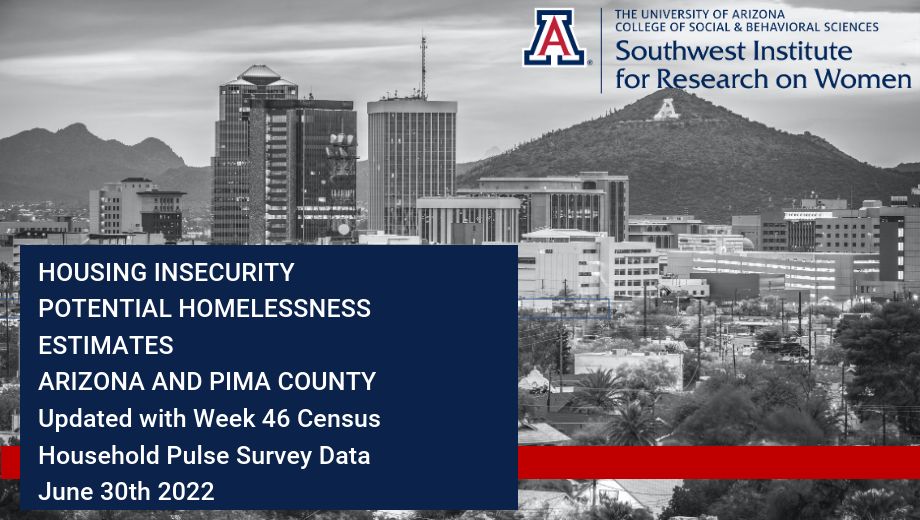 Download the report here. The report notes that while the macroeconomic situation has continued to improve steadily at both the national and state levels, some indicators of concern remain. READ THE REPORT HERE. Inside Out Network Connects Returning Citizens With Critical Support for Reentry The Inside Out Network (ION) is a growing statewide network of supportive people on behalf of people coming out of incarceration. Service providers, faith communities, ministries, and volunteers are banding together to offer a better way to help citizens through reentry. Organizations can also join the network as listed providers. This service is completely free to inmates, returning citizens, and their families and works on all smartphones, tablets, laptops, and desktop computers. Click on the images below to learn more. Community Spotlight: Getting Closer to Ending Homelessness in Houston This New York Times article covers the work being done in Houston to end homelessness: “During the last decade, Houston, the nation’s fourth most populous city, has moved more than 25,000 homeless people directly into apartments and houses. The overwhelming majority of them have remained housed after two years. The number of people deemed homeless in the Houston region has been cut by 63 percent since 2011, according to the latest numbers from local officials. Even judging by the more modest metrics registered in a 2020 federal report, Houston did more than twice as well as the rest of the country at reducing homelessness over the previous decade. Ten years ago, homeless veterans, one of the categories that the federal government tracks, waited 720 days and had to navigate 76 bureaucratic steps to get from the street into permanent housing with support from social service counselors. Today, a streamlined process means the wait for housing is 32 days” READ THE ARTICLE HERE Additional Summer Sun Respite Sites Now Open New sites have been added to the list of cooling centers open to people experiencing homelessness. Please continue to share these resources widely. Download the 2022 Summer Sun Cooling Station flyer (English and Spanish) here. 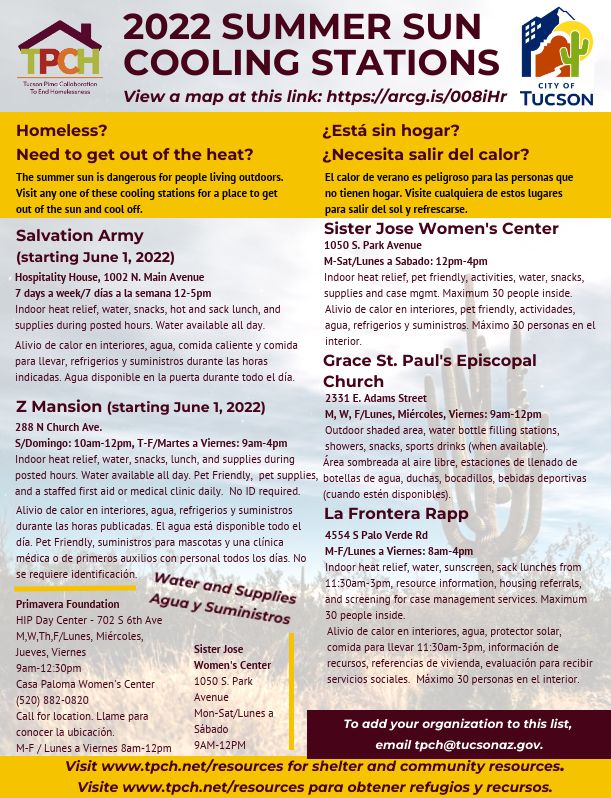 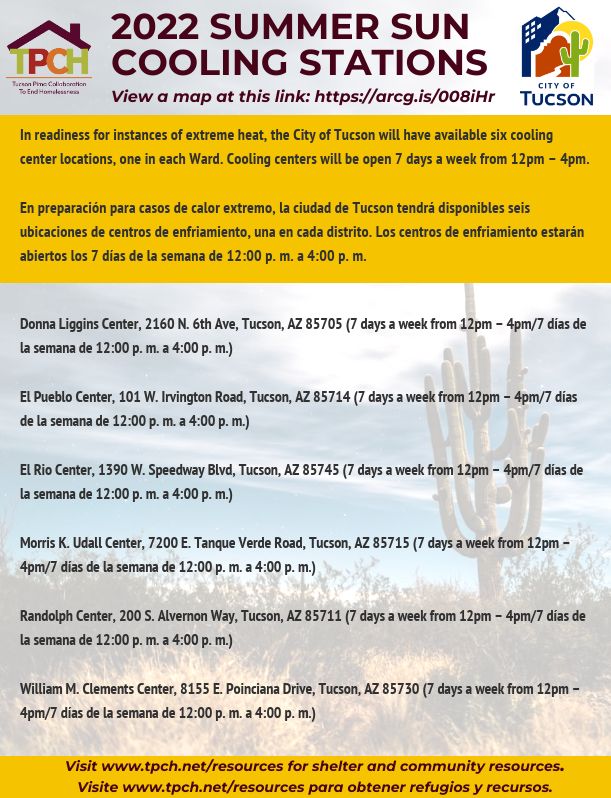 For a map of these cooling centers. hydration stations, pools and splash pads, see this link. Resource Corner: Tools, Conference Opportunities and Upcoming Trainings USICH WEBINAR: SUPPORTING RESILIENCY IN HOUSING AND HEALTH PROFESSIONALS July 15, 2:00-3:00pm Eastern Time (11:00am-12:00pm PT) Health and housing professionals work tirelessly to support individuals and communities facing some of the most significant public health issues. These staff exemplify many strengths including passion, compassion, and determination. These strengths may also be qualities that increase the risk for secondary traumatic stress, compassion fatigue, and burnout—interrelated conditions that can stem from occupational stress. Join this webinar to learn about promoting self-care and resiliency among staff. Hear from subject matter experts on organizational well-being as they share tools and resources to support supervisors in engaging in their own self-care and encouraging it among supervisees. Register here. GLSEN WEBINAR: CREATING SAFER SPACES FOR LGBTQ+ STUDENTS Thursday, July 21, 2022 5-6pm This training is an excellent way to begin conversations about fostering adult-allyship for LGBTQ students in secondary schools. Educators play a critical role for LGBTQ students as adult allies and advocates. According to GLSEN’s national research on the experiences of LGBTQ youth in schools, nearly 4 in 5 LGBTQ students don’t see positive LGBTQ representation in their curriculum and nearly 9 in 10 experience verbal or physical harassment at school. In this workshop, we will present national data on LGBTQ student experiences, work through classroom-based case studies, and provide resources and strategies for creating inclusive schools where all students feel welcome. Register here. ARIZONA HOUSING FORUM August 17-19, 2022 at The Scott Resort & Spa in Scottsdale, AZ The Arizona Housing Coalition is hosting the 2022 Arizona Housing Forum in partnership with the Arizona Department of Housing. This event attracts approximately 350 attendees representing public and private sectors and showcases speakers and sessions on innovations in housing, Low-Income Housing Tax Credit (LIHTC) best practices, and timely topics in the housing industry. It is an unparalleled opportunity for networking among Arizona’s leaders in the affordable housing and ending homelessness fields. Register here. NATIONAL ALLIANCE TO END HOMELESSNESS UNSHELTERED SUPPLEMENTAL NOFO RESOURCE SERIES The 2022 Continuum of Care (CoC) Supplemental Notice of Funding Opportunity (NOFO) to Address Unsheltered and Rural Homelessness (FR-6500-N-25S) makes $322 million available to help communities address unsheltered and rural homelessness. This represents an extraordinarily important opportunity to reverse course on punitive tactics, and demonstrate the effectiveness of evidence-based best practices. The following resources are intended to summarize the application process, policy priorities, scoring criteria, and other key factors that will be central to a successful application. Access the series here. NATIONAL ALLIANCE TO END HOMELESSNESS PRESSURE POINTS SERIES The Alliance’s new Pressure Points Resource Series outlines specific strategies, practices, and philosophies that can help relieve the pressures experienced by providers and systems alike. PREPARE FOR THE NOFO WITH THE NATIONAL ALLIANCE TO END HOMELESSNESS SYSTEM SERIES The 2022 SYSTEM Series is a new collection of webinars, blog posts, and resources designed to help communities build more effective systems to end homelessness. The updated series addresses emerging priorities in the field, as well as insights on issues and areas the Alliance expects HUD to prioritize in the upcoming NOFO. JOIN THE WAITLIST – 2022 NATIONAL CONFERENCE ON ENDING HOMELESSNESS Due to extremely high demand immediately when conference registrations became available, the 2022 National Conference on Ending Homelessness sold out very quickly. If you and your colleagues were hoping to attend the conference and were unable to, NAEH is taking names to add to a waitlist if a spot becomes available. If a spot becomes available, organizers will contact you by July 8, 2022. JOIN THE WAITLIST JULY EVENTS TPCH Meetings & Training Events Meetings and events added regularly. Find details and locations on the TPCH calendar at https://www.tpch.net July 6, 1pm TPCH Webinar – CoC, YHDP, ESG, HOPWA Waiver Update July 7, 3pm Homeless Youth Coalition July 8, 9am Built for Zero Coalition July 11, 1pm Diversity, Equity and Inclusion Committee July 12, 1pm Community Outreach Coalition July 12, 3pm System Performance Evaluation Committee July 13, 3pm Homeless Management Information System Meeting July 14, 5:30pm Youth Action Committee July 28, 3pm Continuum of Care Board Meeting July 28, 1pm Coordinated Entry Committee July 28, 5:30pm Youth Action Committee For the most up-to-date meeting information, visit the TPCH calendar at https://www.tpch.net. |
Author: Elaine MacPherson
-
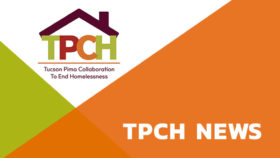
TPCH Newsletter – July 2022
-
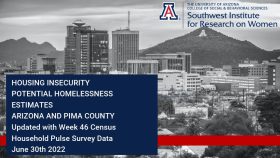
U of A Southwest Institute for Research on Women releases census updates to Housing Insecurity and Potential Homelessness Report
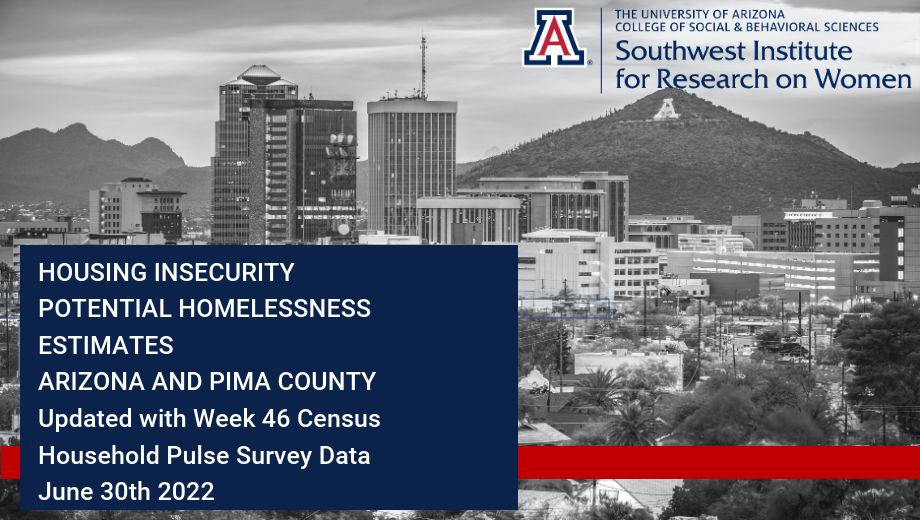
The University of Arizona Southwest Institute for Research on Women has released its thirty-fourth update to its report on Housing Insecurity Indicators and Potential Homelessness Estimates for Arizona and Pima County. This report measures current housing insecurity with newer census data.
The report notes that while the macroeconomic situation has continued to improve steadily at both the national and state levels, some indicators of concern remain.
With the unemployment rate and applications for unemployment insurance in Arizona both at historic lows, why are these indicators of financial strain among renters and mortgage holders increasing relative to previous surveys? One reason could include the distribution of 2021 Child Tax Credits payments (6 months of payments from January-June of 2021) over recent months, which have substantially and temporary reduced financial strain, especially among lower-income households with children.
However, as these payments have now been exhausted by most households, multiple indicators of financial strain have risen in this survey wave. So while more renters are behind (relative to recent waves) a much larger proportion are much less behind on their rent on average.
Some indicators of concern are:
- Rents continue to rise in Tucson with measures of average and median rent increasing 33-36% over the past two years. And the average rents of studio and 1-bedroom apartments have been increasing faster than larger units, contributing to the declining stock of affordable housing.
- 65% of Arizona renters reported an increase in their monthly rent in the last year and 53% reported an increase of $100 or more. This indicates that most renters are being directly impacted by rising rent prices across Arizona.
- The number of people experiencing homelessness in Pima County has risen between 2020 and 2022, but the magnitude of this increase is difficult to discern for reasons detailed below. Racial/ethnic disparities in financial strain have increased in measures of households not being current on rental payments and experiencing difficulty meeting spending needs.
- Individuals (nationwide) reporting either a lot of difficulty or no ability to walk, see, hear, or concentrate also are disproportionately likely to report being behind on rent payments.
- It appears that members of historically marginalized groups (especially people living with disabilities) are not benefiting from the improving economy as quickly on average as other demographic groups.
- Last, the number of eviction filings in Pima County hit a pandemic-era peak in January with 1077 filings, followed by 828 filings in February, 944 filings in March, and 853 in April.
-
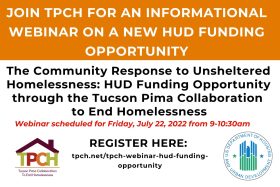
TPCH to Host Webinar on Newly Released HUD Funding Opportunity for Unsheltered Homelessness
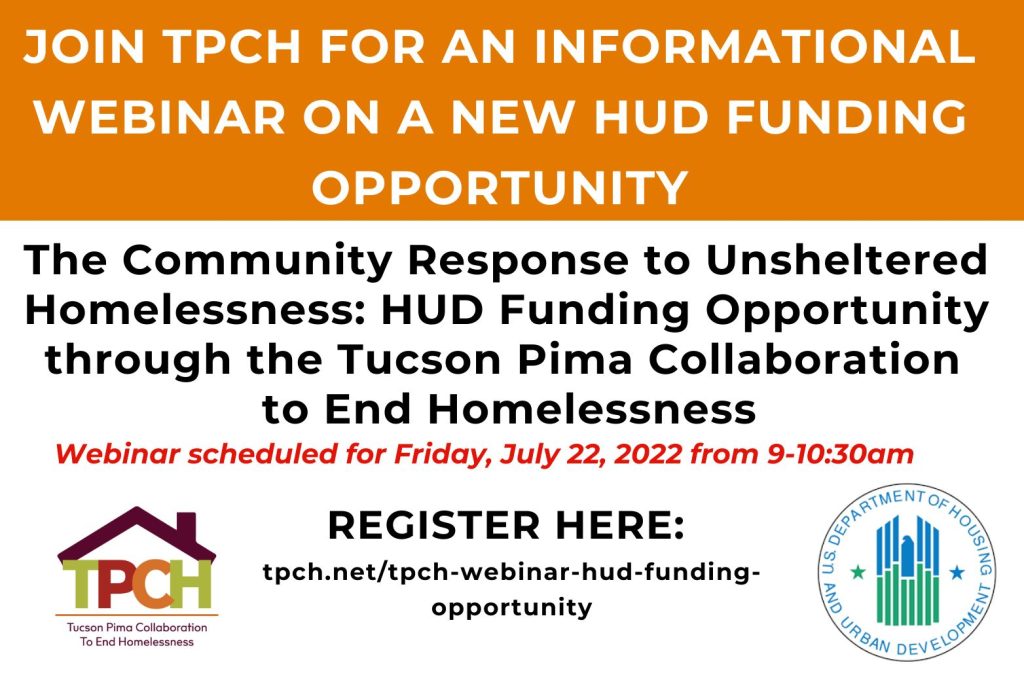
TPCH to Host Webinar on Newly Released HUD Funding Opportunity for Unsheltered Homelessness
Friday, July 22, 9-10:30am
Learn more about the Tucson Pima Collaboration to End Homelessness, its role in preventing and ending homelessness in Pima County, and and an exciting new HUD funding opportunity available via the newly released HUD Supplemental NOFO (Notice of Funding Opportunity) for Unsheltered and Rural Homelessness. This webinar is intended for current and future HUD (Department of Housing and Urban Development) Continuum of Care grant recipients and subrecipients.
On June 22, 2022, the U.S. Department of Housing and Urban Development (HUD) released the Continuum of Care Supplemental to Address Unsheltered and Rural Homelessness (Special NOFO). This is a first-of-its-kind package of resources to address unsheltered homelessness and homeless encampments including funds set aside specifically to address homelessness in rural communities.
Unsheltered Homelessness
Unsheltered homelessness is both a growing problem and a severe one. The Unsheltered NOFO aims to provide CoCs with dedicated resources to address unsheltered homelessness in their communities. It also provides resources to enhance data collection and develop a more comprehensive understanding of people living in unsheltered situations, including encampments.
The COVID-19 pandemic has exacerbated the already significant risks for people experiencing unsheltered homelessness, leaving those individuals with significant unmet healthcare needs particularly vulnerable. As noted above, many unsheltered people suffer from prior health conditions that can worsen the impact of COVID-19. Additionally, the CDC writes that unsheltered people often lack adequate access to hygiene and sanitation facilities, as well as connection to services and healthcare, which are critical to preventing the spread of the virus. In encampment settings, unsheltered people may also find it difficult to socially distance from other residents, further facilitating transmission of COVID-19.
Who is eligible to apply directly for this funding?
Only current Continuums of Care (CoCs) are eligible to apply directly to HUD for this funding, however they coordinate the process for including community project applications.
A Continuum of Care (CoC) is the group organized to carry out the responsibilities prescribed in the CoC Program Interim Rule for a defined geographic area. CoCs should be composed of representatives from a broad array of community organizations, including: nonprofit homeless service providers, victim service providers, faith-based organizations, governments, businesses, advocates, public housing agencies, school districts, social service providers, mental health agencies, hospitals, universities, affordable housing developers, law enforcement, organizations that serve homeless and formerly homeless veterans, and homeless and formerly homeless persons.
Responsibilities of a CoC include planning and operating the CoC (including the implementation of a housing and system within its geographic area that meets the needs of the individuals and families who experience homelessness), designating an HMIS and organizing the process for applying for CoC Program funds.
CoCs applying for funding under this NOFO should build on existing, effective strategies, including those adopted during the pandemic. They should also commit to continuous evaluation of their strategies to improve housing outcomes for people experiencing unsheltered homelessness.
In future messages, SNAPS will share resources exploring strategies for reducing unsheltered homelessness as a whole.
During this session, training participants will:
- Learn about the role of the Tucson Pima Collaboration to End Homelessness as the Pima County Continuum of Care as it relates to HUD funding,
- Learn about a newly available HUD funding and how it relates to the strategies TPCH employs to prevent and end unsheltered homelessness, and
- Receive instructions regarding next steps for agencies interested in applying to the Tucson Pima Collaboration to End Homelessness for HUD funding through the NOFO to address unsheltered homelessness.
Who Should Attend: This webinar is intended for current and future recipients and subrecipients of Continuum of Care funding in Pima County, Arizona.
For more information, please contact tpch@tucsonaz.gov.
-

TPCH Newsletter – June 2022
TPCH Newsletter – June 2022
President Biden Announces New Actions and Urges Congress to Make Housing More Affordable
The Action Plan outlines a series of steps federal agencies either are taking or will take in the next year, including:
-Reward jurisdictions that have reformed zoning and land-use policies.
-Deploy new financing mechanisms to build and preserve more housing where financing gaps currently exist.
-Expand and improve existing forms of federal financing.
-Ensure that more government-owned supply of homes and other housing goes to owners who will live in them.
-Work with the private sector to finish construction in 2022 on the most new homes in any year since 2006.
The Action Plan also reiterates calls for Congress to pass Biden administration proposals, some of which have received bipartisan support, to:
-Expand the Low-Income Housing Tax Credit
-Create a Neighborhood Homes Tax Credit
-Incentivize zoning reform
-Increase Housing Trust Fund and HOME resources
-Create a Housing Supply Fund
-Expand resources for production and preservation of housing in rural and Tribal communities
These combined actions, along with current momentum in the market and reforms at the state and local levels, will help close the housing supply gap in 5 years.
READ MORE HERE.
Perspectives on Rental Housing
The Joint Center for Housing Studies of Harvard University has released its 2022 Report on Rental Housing. Rental housing is home to more than a third of US households, including a growing number of older and wealthier households. This report analyzes key trends and issues related to the changing nature of demand; the cost, character, and location of the stock; and the government policies that affect the supply of market-rate and subsidized units.
Considering the challenge of a severe shortage of affordable housing stock, the National Alliance to End Homelessness suggests employing the strategy of master leasing.
What is Master Leasing?
A master lease is a type of lease that gives the lessee the right to control and sublease the property during the lease, while the owner retains the legal title. In this case, a housing authority or service provider would be the lessee, allowing them to sublease the property to its clients.
There are various forms of master leasing, but most prefer a “triple net” agreement—which means that the lessee assumes all responsibility for maintenance, repairs, taxes, and insurance. Read more about master leasing in this blog post from the National Alliance to End Homelessness.
Heat Relief Centers Open
Download the 2022 Summer Sun Cooling Station flyer (English and Spanish) here.
For a map of these cooling centers. hydration stations, pools and splash pads, see this link.

U of A Southwest Institute for Research on Women releases census updates to Housing Insecurity and Potential Homelessness Report
The University of Arizona Southwest Institute for Research on Women has released its 33rd update to its report on Housing Insecurity Indicators and Potential Homelessness Estimates for Arizona and Pima County. This report measures current housing insecurity with newer census data.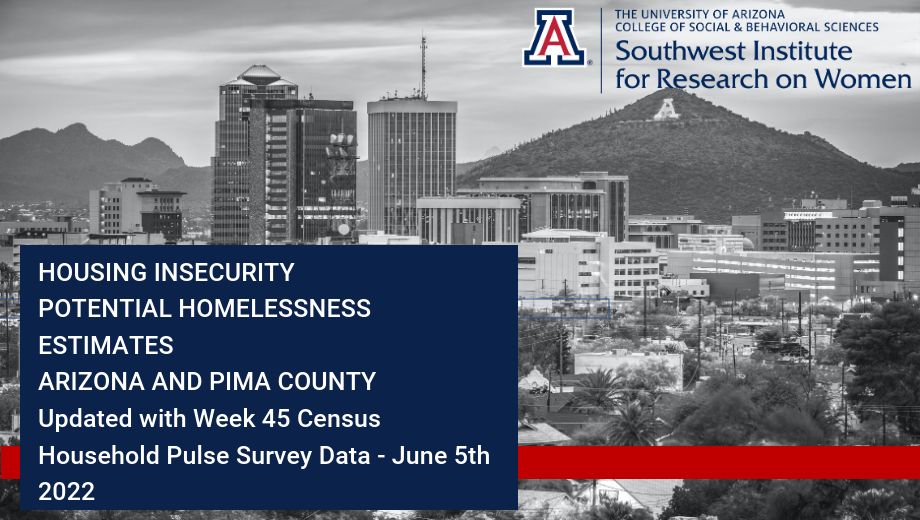
Download the report here.
Emerging into the New Normal – Planning Considerations for Emergency Shelter Providers in Congregate and Semi-Shared Settings
Join TPCH, the Pima County Health Department, and the City of Tucson Housing and Community Development Department for this 90-minute webinar and community discussion regarding safety considerations in an ongoing pandemic environment.
Many shelter providers are asking – when and how should we safely increase our shelter capacity again? This 90-minute webinar will help you answer this important question and more.
June 23, 2022 – 2-3:30pm
Click here to register.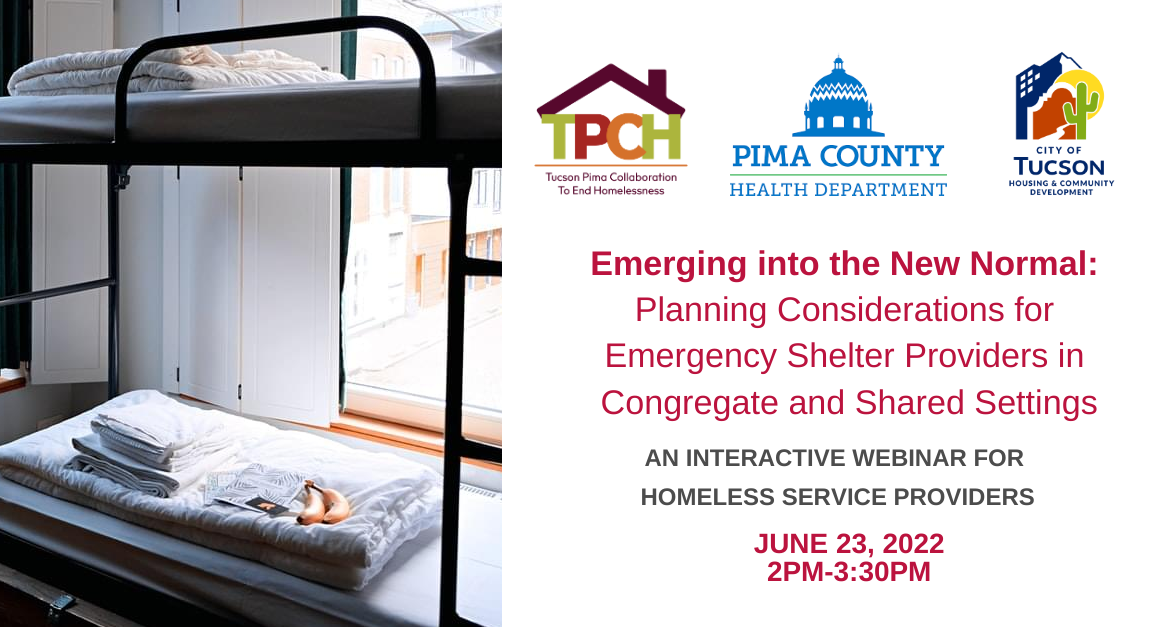
Affordable Center of Hope Apartments Open on Tucson’s Southside
The Center of Hope Apartments, comprised of affordable housing apartments meant to house those who have experienced homelessness, are officially open. La Frontera Arizona led the strategic collaboration to make this project possible.
“You can’t have enough affordable housing. I think going through the COVID epidemic increased the problem proportionately,” said Dr. Dan Ranieri, President and CEO of La Frontera Arizona. Read more on this critical affordable housing development below.
READ MORE HERE.
City of Tucson Housing First Resource Line
The City of Tucson Mayor and Council took action to create a dedicated Resource Line administered through the City of Tucson to be available 24/7. For folks who are in need of community resources but don’t know where to begin, this can be a great starting resource.
 Call 24/7:
Call 24/7: (520) 791-2540 
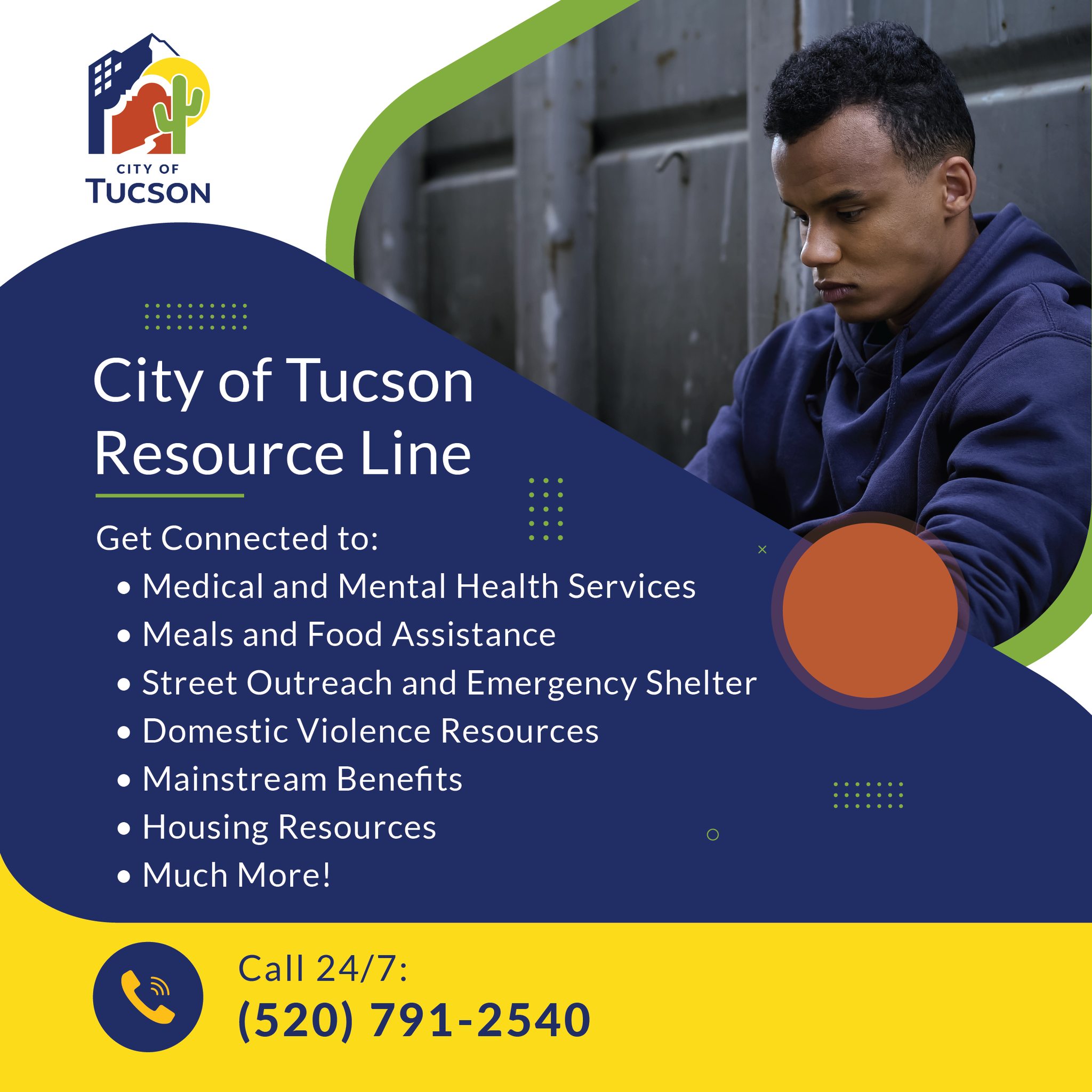
Free Bus Fares Continue Through December 31, 2022
Fares will remain free through December 31, 2022 on Sun Tran, Sun Link, Sun Van, Sun On Demand and Sun Shuttle. The City of Tucson suspended ride fees in March 2020, with the onset of the pandemic.
For schedules and more information, visit the SunTran website.
Call for Focus Group Participation – Homelessness and Housing Data Experts Needed
The Southwest Institute for Research on Women (SIROW) hopes to collaborate with TPCH and other local organizations on a two-year project seeking to identify and address gaps in information that are available and widely accessible about homelessness and housing insecurity in Pima County.
People who work to end homelessness and who directly serve people experiencing homelessness are especially needed so researchers can learn more about where there are gaps in available data.
There are multiple sessions to provide multiple opportunities for you to attend, but no one is expected to attend more than one session.
June 16th 3:00-4:30
https://arizona.zoom.us/j/82893021864
June 21st 10:00-11:30
https://arizona.zoom.us/j/86450832010
June 30th 3:00-4:30
https://arizona.zoom.us/j/88900552648
Click HERE for more info.
If you have any questions about this project, please do not hesitate to contact Keith Bentele (Associate Research Professor at SIROW) at keithb@arizona.eduor(954) 621-5141 (520)730-5669 
Tucson Juneteenth Festival to Happen June 18-19th at Kennedy Park Fiesta Area
The 157th anniversary of our country’s Juneteenth celebration happens in 2022. Celebrations in Tucson and around the USA aim to increase knowledge and appreciation of the roles, achievements and contributions of African Americans to our society and pay tribute to this important milestone in our nation’s history –the annual commemoration of the end of slavery on June 19, 1865.
Enjoy historical presentations and exhibits, music and dance, arts, crafts and food vendors, at Kennedy Park Stage Arena.
There will also be a Gospel Jubilee and Father’s Day luncheon at Dunbar Pavilion, 325 W 2nd Street from 3:00 PM to 6:00 PM.
Click on the image below to visit the event website for more updates.
Featured Blog Post: Progressive Engagement
What Is Progressive Engagement?
Providing effective services at a time of understaffing across all sectors is a challenge many organizations face. In a new blog post, the National Alliance to End Homelessness suggests using progressive engagement to approach the varying service demands for all involved.
Progressive engagement is a person-centered approach to ending someone’s homelessness. It is based on tailoring assistance to each individual or household’s needs and assessing what works best for them, with their specific strengths, and in their specific situation.
READ MORE HERE.
Southern Arizona VA Health Care System (SAVAHCS) announces its annual Virtual Homeless Summit
Save the Date: Thursday, July 28, 2022
This year’s SAVAHCS Virtual Homeless Summit will celebrate the theme of “Perseverance Through Difficult Times.”
The summit will include remarks from the SAVAHCS VA Director, a discussion of the City of Tucson and Tucson community’s response to homelessness, as well as a focus on how special populations can best access employment, peer support, and other critical services.
Access this meeting with the following information:
ZoomGov Meeting Dial in:+1 551 285 1373
Meeting ID: 161 748 2786
Access the meeting using this URL, or click on the image below: https://www.zoomgov.com/j/1617482786?pwd=MWRILzFHa1BmSkh4cnIMb3BUdIRDUT09
Resource Corner: Tools, Conference Opportunities and Upcoming Trainings
CENTERING RACIAL EQUITY IN THE WORK TO END HOMELESSNESS: ALIGNING VISION WITH PRACTICE AT THE SYSTEMS LEVEL
Intractable as it may seem, figuring out how to center racial equity in the work to end homelessness can be effectively done with strategic planning, the right information, and investment. Systems leaders have a high level of influence over cultural norms, policy, and practice, making them well positioned to shape homelessness system design to promote racial equity. This webinar will offer some practical road maps for making profound and sustainable change at the systems level.
Thursday, June 16, 2022. 1-2:15pm ET, register here.
NOTHING ABOUT US WITHOUT US: INVOLVING PEOPLE WITH LIVED EXPERIENCE IN COC DECISIONS
Federal homelessness funding for the Continuum of Care Program prioritizes the input and inclusion of people with lived experience in local decision-making. Too often, this participation can seem tokenizing. This webinar will showcase speakers from three communities to discuss what genuine involvement looks like and how to include the voices of people who know homelessness firsthand. Happening Thursday, June 23 from 2:00 – 3:00 pm ET, register here.
ARIZONA HOUSING COALITION HOUSING FORUM
The Arizona Housing Coalition is hosting the 2022 Arizona Housing Forum, in partnership with the Arizona Department of Housing on August 17-19, 2022 at The Scott Resort & Spa in Scottsdale. This event attracts approximately 350 attendees representing public and private sectors and showcases speakers and sessions on innovations in housing, Low-Income Housing Tax Credit (LIHTC) best practices, and timely topics in the housing industry. It is an unparalleled opportunity for networking among Arizona’s leaders in the affordable housing and ending homelessness fields. Register here.
NATIONAL ALLIANCE TO END HOMELESSNESS PRESSURE POINTS SERIES
The Alliance’s new Pressure Points Resource Series outlines specific strategies, practices, and philosophies that can help relieve the pressures experienced by providers and systems alike.
PREPARING FOR THE NOFO WITH THE NATIONAL ALLIANCE TO END HOMELESSNESS SYSTEM SERIES
The 2022 SYSTEM Series is a new collection of webinars, blog posts, and resources designed to help communities build more effective systems to end homelessness.
The updated series addresses emerging priorities in the field, as well as insights on issues and areas the Alliance expects HUD to prioritize in the upcoming NOFO.
JOIN THE WAITLIST – 2022 NATIONAL CONFERENCE ON ENDING HOMELESSNESS
Due to extremely high demand immediately when conference registrations became available, the 2022 National Conference on Ending Homelessness sold out very quickly. If you and your colleagues were hoping to attend the conference and were unable to, NAEH is taking names to add to a waitlist if a spot becomes available. If a spot becomes available, organizers will contact you by July 8, 2022.
ALLYSHIP IN OWNERSHIP: HOW TO COLLECT RENT IN AN EQUITABLE WAY
Allyship in Ownership is a 4 week course dedicated to discussing what it means to own property and collect rent in an ethical and equitable way. With rents going up dramatically and the increasing housing crisis, we look at how property owners can take action to mitigate some of the pressing issues, both current and historical. Trainings will happen on Tuesdays in July (5, 12, 19, 26) from 5:00-8:00pm (Mountain Standard Time). Find out more here.
JOIN THE WAITLIST.
JUNE EVENTS
Meetings and events added regularly. Find details and locations on the TPCH calendar at https://www.tpch.net
April 6, 9am
Critical Time Intervention Training: First Session
June 2, 3pm
Homeless Youth Coalition
June 8, 3pm
Homeless Management Information System Meeting
June 9, 5:30pm
Youth Action Committee
June 10, 9am
Built for Zero Coalition
June 13, 1pm
Diversity, Equity and Inclusion Committee
June 14, 1pm
Community Outreach Coalition
June 14, 3pm
System Performance Evaluation Committee
June 23, 1pm
Coordinated Entry Committee
June 23, 5:30pm
Youth Action Committee
June 28, 3pm
Continuum of Care Board Meeting
For the most up-to-date meeting information, visit the TPCH calendar at https://www.tpch.net. -
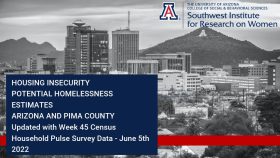
U of A Southwest Institute for Research on Women releases census updates to Housing Insecurity and Potential Homelessness Report

The University of Arizona Southwest Institute for Research on Women has released its thirty-third update to its report on Housing Insecurity Indicators and Potential Homelessness Estimates for Arizona and Pima County. This report measures current housing insecurity with newer census data.
Some updates of note demonstrating positive trends of increased housing security include:
-The macroeconomic situation has continued to improve steadily at both the national and state levels.
-In the Census Household Pulse Survey wave, conducted January 26th to February 7th 2022, the proportion of Arizona renters not current was 12.2%. In the most recent wave, conducted April 27th to May 9th 2022, this proportion not current held steady at 5.2% the same as the previous survey wave.
-Of those non-current renters the proportion who reported that they were “very likely” to experience an eviction in the next two months remained very low, 6.1%, while the proportion seeing eviction as “not likely at all” more than doubled.
-Among these non-current renters, the vast majority, 70%, are only 1 or 2 months behind on their rent (down from 80% in the previous survey wave).
-This survey also contains the largest proportion of non-current renters who reported having applied for and received rental assistance, and the lowest proportion reporting that they have not applied for assistance in this survey to date. This suggests that non-current renters in Arizona have been more active in pursuing and more successful in receiving rental assistance in recent weeks.
-Confidence in ability to pay next month’s rent among Arizona renters remained stable relative to the last survey wave. Arizona mortgage holders are also doing very well, with recent improvements holding steady.
Some indicators of concern include:
-Individuals (nationwide) who have reported either a lot of difficulty or no ability to walk, see, hear, or concentrate also are very disproportionately likely to report being behind on rent payments.
-It appears that members of historically marginalized groups (especially people living with disabilities) are not benefiting from the improving economy as quickly on average as other demographic groups.
-The number of eviction filings in Pima County hit a pandemic-era peak in January with 1077 filings, followed by 828 filings in February, 944 filings in March, and 853 in April.
-

Call for Focus Group Participation – Homelessness and Housing Data Experts Needed

The Southwest Institute for Research on Women (SIROW) hopes to collaborate with TPCH and other local organizations on a two-year project Let’s Measure Better* seeking to identify and address gaps in information that are available and widely accessible about homelessness and housing insecurity in Pima County.
We need the expertise of people who work to end homelessness and who directly serve people experiencing homelessness to learn more about where there are gaps in available data.
Is there information related to homelessness or housing insecurity that prevents you from meeting individual/community needs or operating effectively and efficiently? Are there examples of information that you currently do not have but that would be helpful to you in your work?
We want to hear about these data gaps and strategize about how to address them together. SIROW will be holding a series of focus groups in coming weeks to solicit your input on these topics and learn more about specific data that might be very helpful to you. There are multiple sessions to provide multiple opportunities for you to attend, but no one is expected to attend more than one session.
June 16th 3:00-4:30
https://arizona.zoom.us/j/82893021864June 21st 10:00-11:30
https://arizona.zoom.us/j/86450832010June 30th 3:00-4:30
https://arizona.zoom.us/j/88900552648These focus groups are the beginning of a two-year process in which SIROW researchers will assess community data needs, work to facilitate access and/or creation of these data, and house this information in a publicly available dashboard (as appropriate). Your participation is both deeply appreciated and critical to the success of this project. If you cannot attend a focus group, but have ideas about data needs that would like to share, we will be in touch at a later date with alternative ways to participate.
If you have any questions about this project, please do not hesitate to contact Keith Bentele (Associate Research Professor at SIROW) at keithb@arizona.edu or (954) 621-5141 or Claudia Powell (Associate Director of SIROW) at (520)730-5669.
Thank you!
Full Zoom access details:
Topic: Let’s Measure Better Focus Group 1
Time: Jun 16, 2022 03:00 PM ArizonaJoin Zoom Meeting
https://arizona.zoom.us/j/82893021864One tap mobile
+16027530140,,82893021864# US (Phoenix)
+12532158782,,82893021864# US (Tacoma)Dial by your location
+1 602 753 0140 US (Phoenix)
+1 253 215 8782 US (Tacoma)
+1 346 248 7799 US (Houston)
+1 669 900 6833 US (San Jose)
+1 301 715 8592 US (Washington DC)
+1 312 626 6799 US (Chicago)
+1 646 876 9923 US (New York)
Meeting ID: 828 9302 1864
Find your local number: https://arizona.zoom.us/u/kzdXQg1leJoin by Skype for Business
https://arizona.zoom.us/skype/82893021864Topic: Let’s Measure Better Focus Group 2
Time: Jun 21, 2022 10:00 AM ArizonaJoin Zoom Meeting
https://arizona.zoom.us/j/86450832010One tap mobile
+16027530140,,86450832010# US (Phoenix)
+16699006833,,86450832010# US (San Jose)Dial by your location
+1 602 753 0140 US (Phoenix)
+1 669 900 6833 US (San Jose)
+1 253 215 8782 US (Tacoma)
+1 346 248 7799 US (Houston)
+1 646 876 9923 US (New York)
+1 301 715 8592 US (Washington DC)
+1 312 626 6799 US (Chicago)
Meeting ID: 864 5083 2010
Find your local number: https://arizona.zoom.us/u/kbBU9Y6nXVJoin by Skype for Business
https://arizona.zoom.us/skype/86450832010Topic: Let’s Measure Better Focus Group 3
Time: Jun 30, 2022 03:00 PM ArizonaJoin Zoom Meeting
https://arizona.zoom.us/j/88900552648One tap mobile
+16027530140,,88900552648# US (Phoenix)
+16699006833,,88900552648# US (San Jose)Dial by your location
+1 602 753 0140 US (Phoenix)
+1 669 900 6833 US (San Jose)
+1 253 215 8782 US (Tacoma)
+1 346 248 7799 US (Houston)
+1 646 876 9923 US (New York)
+1 301 715 8592 US (Washington DC)
+1 312 626 6799 US (Chicago)
Meeting ID: 889 0055 2648
Find your local number: https://arizona.zoom.us/u/kj3JRJ15aJoin by Skype for Business
https://arizona.zoom.us/skype/88900552648 -

TPCH Announces Continuum of Care Board and Committee Seats

The TPCH 2022 Continuum of Care Election Process Has Concluded
Newly seated members will begin terms July 1, 2022
Through participation from more than twenty-five Tucson Pima Collaboration to End Homelessness General Council members, members of the CoC governing board and five committees are now seated. TPCH welcomes the perspectives and expertise of our new board and committee members in our mission to prevent and end homelessness in Tucson and Pima County.
Continuum of Care Board
The CoC Board serves as the primary decision-making body for TPCH. The CoC Board acts on behalf of the TPCH General Council in setting policy and governing oversight for our coalition. Board Members participate in monthly CoC Board Meetings and to contribute time and effort to CoC activities throughout the year. Board members are elected by the TPCH General Council.
Board members abide by the CoC Board Member Job Description, TPCH Code of Conduct, and TPCH Conflict of Interest Policy
Newly seated members of the Continuum of Care Board include:
Jocelyn Muzzin, VA Southern Arizona – Board Chairperson
Brandi Champion, City of Tucson
Chaelee Chavez, Our Family Services
Diego Coronado, Youth on Their Own
Ed Sakwa, Emerge! Center Against Domestic Abuse
Emma Hockenberg, Primavera Foundation
Erina Delic, Pima County
Josh Carzoli, El Rio
Lisa Floran, United Way of Tucson and Southern Arizona
Pam Mosely, Arizona Department of Economic Security
Shannon Fowler, University of Arizona Southwest Institute for Research on Women (UA SIROW)
Silvia Chavez, Arizona Department of Education
Taylor Miranda, Crisis Response Center
Terry Galligan, City of Tucson
Tom Litwicki, Old Pueblo Community Services
Yvette Gonzales, Pima County
YAC Representative, To Be Appointed
Vacant, Lived Experience Seat
Vacant, Lived Experience SeatContinuum of Care Committees
TPCH committees conduct research and provide expertise to advance the mission of the Tucson/Pima County Continuum of Care and support the CoC Board. Committee Members participate in regular committee meetings and contribute time and effort to CoC activities throughout the year. Committee members are elected by the TPCH General Council and appointed by the CoC Board.
Download a full description of the CoC committees here.
Committee members are expected to abide by the TPCH Code of Conduct and TPCH Conflict of Interest Policy.
Newly seated Members of the Continuum of Care Committees include:
Homeless Management Information System (HMIS) Committee:
Megan Sanes, Our Family Services – Committee Chairperson
Andrea Bedoy, Southern Arizona Aids Foundation
Anna Billings, Old Pueblo Community Services
Kat Jacobs, Community Solutions
Melissa Scaff, City of Tucson
Valerie Grothe, La Frontera
Yvette Gonzales, Pima CountyCoordinated Entry Committee:
Melissa Benjamin, Our Family Services – Committee Chairperson
Cat Polston, City of Tucson
Emma Hockenberg, Primavera Foundation
Jack Julsing, Tucson Police Department
Margaret “Mickie” White, Direct Advocacy & Resource Center
Terrance Watkins, Community Partners of Southern Arizona
Valerie Grothe, La Frontera
Victoria Tullercash, Youth on Their OwnDiversity, Equity, and Inclusion Committee
Victoria “Tori” Micharski, La Frontera – Committee Chairperson
Alfonzo Lopez, VA Southern Arizona
Cat Polston, City of Tucson
Claudia Powell, University of Arizona Southwest Institute for Research on Women (UA SIROW)
Daniel Armenta, Youth on Their Own
Josh Carzoli, El Rio
Keona Rose, Youth Collaboratory Team
Laurie Mazerbo, Our Family Services
Simikka Milligan, Student
Stephanie Santiago, Community Activist
Tanya Moreno, Primavera Foundation
Terrance Watkins, Community Partners of Southern ArizonaContinuum of Care Program Grant Committee
Tim Kromer, Interfaith Community Services – Committee Chairperson
Art Gage, Art Gage Law
Diego Coronado, Youth on Their Own
Jenifer Darland, Pima County
Lisa Floran, United Way of Tucson & Southern Arizona
Penny Buckley, Sister Jose Women’s Center
Stephanie Santiago, Community Activist
Taylor Miranda, Crisis Response Center
Vacant, Lived Experience SeatSystem Performance Evaluation Committee
Lori Kindler, Arizona Serve – Committee Chairperson
Lindsay Eulberg, Old Pueblo Community Services
Ana Lucero, Youth on Their Own
Dia Nonaka, HOM Inc.
Jocelyn Muzzin, VA of Southern Arizona
Chaelee Chavez, Our Family Services
Thelma Magallanes, City of Tucson
Kristy Snowden, Compass Affordable Housing
Vacant, Lived Experience Seat -
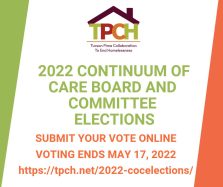
TPCH 2022 Continuum of Care Board and Committee Elections
TPCH CONTINUUM OF CARE BOARD AND COMMITTEE ELECTIONS
ALL VOTES DUE BY 11:59PM ON TUESDAY, MAY 17
Please attend Thursday’s General Council Annual meeting when the voting to elect TPCH leadership begins. Members of the TPCH General Council with voting privileges are eligible to vote on all vacant Board and Committee seats.
Am I eligible to vote in this election?
Check the current roster of TPCH General Council members with voting privileges here.
ELECTION MATERIALS
Download the Board and Committee election materials here. This package includes:
- Overview of the election process and voting instructions
- Roster of current members of TPCH General Council with voting privileges as of May 6, 2022
- Roster of seated CoC Board Members
- Roster of CoC Board and Committee candidates
- Listing of CoC Board and Committee candidates with indication of desired areas of expertise as defined by the TPCH Committee Composition Operating Policy and key diversity goals
- Candidate statements of interest and affiliations
- Overview of CoC Committee purpose and summarized responsibilities
- Quick Reference tool identifying candidates by organization and bodies to which each candidate has applied
VOTING INSTRUCTIONS
Voting will occur online, starting May 12. Cast your vote here.
Only one ballot may be cast for each TPCH voting member identified in the membership roster. Multiple votes from the same agency will not be accepted.
Ballots may not include votes for more candidates than are eligible for election on any voting body. The ballot indicates the total number of votes that can be cast for each voting body.
No individual may serve on more than two elected bodies of the Continuum of Care (CoC Board + 1 Committee, or 2 Committees).
No agency may have more than two representatives seated on any elected body. If an agency has two elected representatives, each representative will have one vote on all actions taken by the elected body.
All ballots must be cast online no later than 11:59pm on Tuesday, May 17.
Late ballots will not be accepted.
-
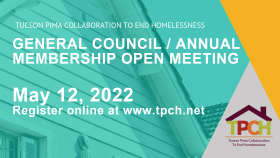
TPCH General Council/Annual Meeting Meets May 12, 2022
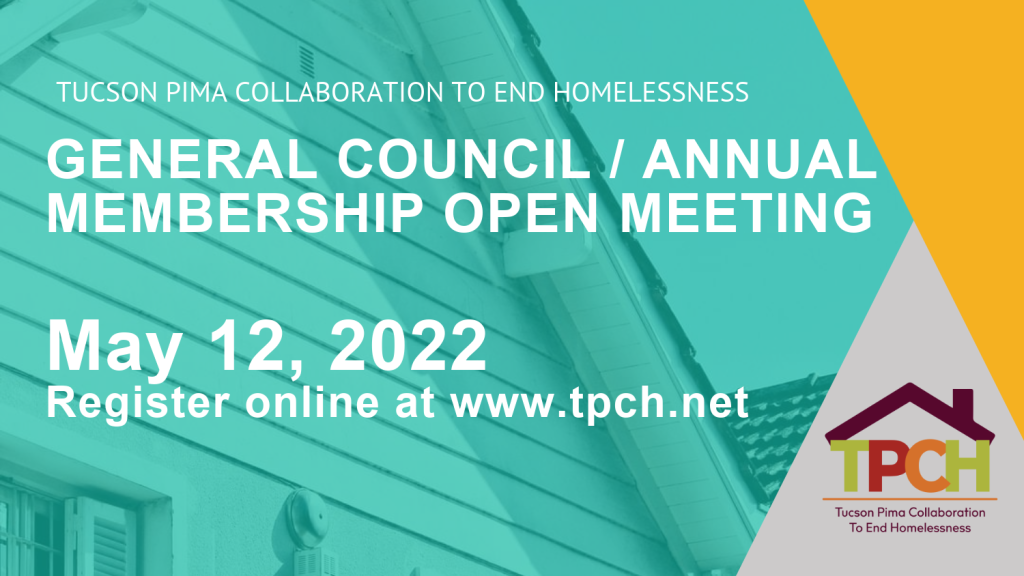
TPCH Quarterly Membership Meeting Thursday, May 12
3pm-5pm (Zoom)
Join us for the second quarterly General Council meeting (Annual Meeting) of the TPCH membership on Thursday, May 12. This meeting will be held virtually and pre-registration is required.For a list of members eligible to vote in this meeting, see the TPCH Voting Member Roster linked below.
Click here to register for the May 12 General Council Meeting.
After registering, you will receive an automated email with details to access the meeting.
Summary Meeting Agenda
Community Celebrations
Facilitated by Daniela Figueroa, CoC Board Chairperson
Quarterly Update on TPCH Activities and Financials
Presented by Karen Fogas, CoC Lead Agency (City of Tucson)
TPCH Committee and Coalition Updates
Presented by Committee and Coalition Leaders
Overview of the Board and Committee Application Process
Presented by Karen Fogas, CoC Lead Agency (City of Tucson)Download May 12 Meeting Materials
TPCH General Council Meeting Agenda (May 12, 2022)
